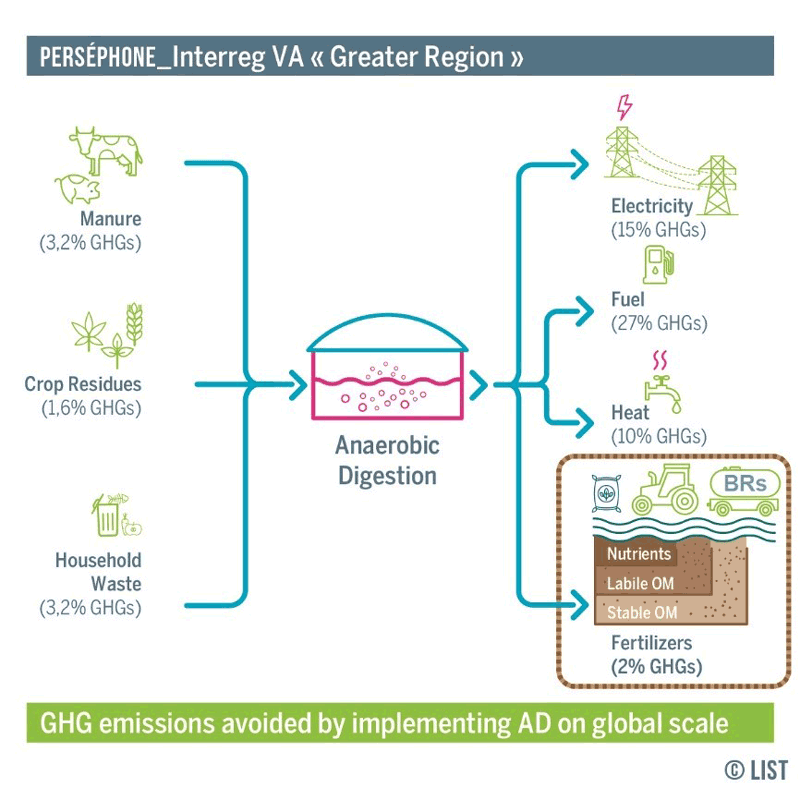by Bella Tsachidou, Christophe Hissler (Luxembourg Institute of Science and Technology) and Philippe Delfosse (University of Luxembourg)
A team from the Environmental Research and Innovation Department of the Luxembourg Institute of Science and Technology (LIST) is investigating the contribution of biogas residues (BRs) to climate change mitigation through carbon sequestration in agricultural soils.
Climate change is one of the most complex global problems faced by humanity. There are two main approaches to mitigate climate change: (i) to reduce the sources of greenhouse gases (GHGs) and (ii) to sequester GHGs; i.e., to enhance the pools that have the capacity to accumulate and store them. Anthropogenic activities, such as land use, excessive fertilisation and fossil fuel overuse, have altered the cycling and storage of carbon, leading to the depletion of terrestrial reservoirs over time. Therefore, carbon sequestration and its long-term storage in terrestrial ecosystems, including agricultural soils, is considered the most effective measure to reduce GHGs in the atmosphere [1] while improving soil quality and productivity.
The input of organic matter (OM) to agricultural soils has been a means of improving soil fertility and agronomic productivity since the dawn of civilisation, and the application of manure, agricultural residues and other organic waste on fields is still a common practice. Despite this, a large proportion of organic waste is still landfilled or at best composted. A more effective use of organic waste in agriculture, at a lower environmental cost and with multiple societal benefits, can be achieved via the process of anaerobic digestion. Biogas residues are the by-product of organic waste treated through anaerobic digestion, and their application on agricultural land has the potential to impel the agricultural sector towards sustainability and a circular economy. In addition to their demonstrated fertilising properties, biogas residues also have the potential to promote terrestrial carbon sequestration due to their high content of stable organic matter. Therefore, using biogas residues as biofertilizers could help combat climate change, both by offsetting greenhouse gas emissions inherent to the landfilling, composting or storage of organic wastes, and by increasing the size of soil carbon sinks.
A novel field study within the framework of the PERSEPHONE project has been implemented at LIST to investigate the dual property of biogas residues as a valuable source of nutrients for plants and soil organisms, and as a wherewithal to boost carbon sequestration and storage in agricultural ecosystems. More specifically, as organic carbon sequestration potential is greater in grasslands than in arable land [2], we have conducted in situ experiments on permanent grasslands in the Greater Region aiming to understand the stability of biogas residues and, at the same time, assess the impact of different nitrogen sources on the decomposition capacity of the soils. Before biogas residues can replace chemical fertilisers on a large scale, it is essential to understand organic matter decomposition and stabilisation. Since biogas residues are rich in stable organic carbon, post-anaerobic digestion – particularly the use of their solid fraction – could constitute an integral component of this land-based solution to climate change.
To maximise the environmental benefits of biogas residues and to determine application strategies, we need to be able to estimate their decomposition rates and nutrient release. Furthermore, given the wide range of biotic and abiotic modulators involved in decomposition studies with an unpredictable impact on soil carbon storage and release, the generation of decomposition data could increase the predictive power of climate models and consequently facilitate climate-smart agriculture. Finally, it is important to demonstrate the potential of biogas residues to sequester stable organic carbon in agricultural soils not only for the sake of climate change mitigation, but also for agricultural productivity.
Implementing anaerobic digestion on a global scale and using biogas residues on agricultural land can fulfil several desiderata sought in sustainable agriculture and climate change mitigation strategies, including: organic waste management, offsetting greenhouse gas emissions, carbon sequestration, reduction of fossil fuel use, moderation of manufacture and application of synthetic fertilisers, soil health enhancement, and rural revenue (Figure 1). This approach can substantially benefit both ecosystem services and the economy by improving human health, food security and environmental remediation on a European and global level.

Figure 1: Implementation of anaerobic digestion on a global scale to mitigate climate change by reducing greenhouse gas emissions and enhancing storage of stable organic carbon in agricultural soils.
This study is being conducted in collaboration with the PERSEPHONE project partners within the framework of the Transfrontier Program for European Territorial Cooperation, and is co-financed by the European Union - European Regional Development Fund 2014-2020 INTERREG VA “Greater Region” and the Ministère de l'Environnement, du Climat et du Développement durable (MECDD) of Luxembourg.
References:
[1] I. P. Hartley, B. K. Singh: “Impact of Global Changes on Soil C Storage—Possible Mechanisms and Modeling Approaches,” in Soil Carbon Storage, B. K. Singh, Ed. Elsevier, 2018, 245–279.
[2] R. Lal, W. Negassa, K. Lorenz: “Carbon sequestration in soil,” Current Opinion in Environmental Sustainability, 2015.
Please contact:
Bella Tsachidou
Luxembourg Institute of Science and Technology, Luxembourg
+352 470 261 5033










